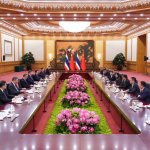
Foodpanda, a major food delivery service in Thailand recently faced a backlash and a spontaneous boycott from pro-democracy protesters after it tweeted from its official account that an anti-government demonstrator was committing an act of “terrorism”, after a man dressed as a food delivery man was filmed trying to set fire to an image of King Maha Vajiralongkorn. The man, named Sitthichoke, later claimed that he was only trying to extinguish flames from an existing fire at the base of the portrait. He was later charged with lèse majesté. After promising to fire Sitthichoke “immediately,” an online boycott began, with the hashtag #แบนfoodpanda reaching as many as 1.25 million mentions last week, despite an official apology from the company.
Overnight, Foodpanda became another cautionary tale of doing business in Thailand during turbulent political times. In a divided Thai society, companies cannot possibly predict or account for the behavior of their staff outside of working hours or in the case of Foodpanda, which relies on contracted delivery drivers, monitor their activities. They would also not be the first to fall into the position where they are asked to take sides in an ideological conflict. In March, activists called for the boycott of restaurant chains MK and Yayoi due to their connections with conservative channel Top News after anchor Sathaporn Kuasakul shared a photo of his food delivery on Facebook. As with Foodpanda in July, the hashtag #แบนmkและยาโยอิ trended on Twitter in late March, while politicians like Move Forward MP Amarat Chokepamitkul publicly noted she would stop ordering from both restaurant chains.

What makes both the Foodpanda, MK, and Yayoi boycotts compelling is their spontaneity. Both incidents followed intense bouts of political protest—a March 20 pro-democracy protest at Sanam Luang where protesters demanded Constitutional reforms and the release of jailed dissidents and a July 18 protest over Thai Prime Minister Prayut Chan-ocha’s handling of the COVID-19 pandemic. Social movements, including economic boycotts can be sparked by impassioned individuals or groups during difficult circumstances, but sustaining them requires considerable planning.
Dr. Gene Sharp, the late American scholar in non-violent civil disobedience, noted that while economic boycotts may be spontaneous and at first may appear successful, that success should not be left to chance. Activists have to increase the likelihood of achieving their objectives through the use of strategic planning. This involves moving beyond the naive notion that the assertion of a position will ultimately ensure the achievement of political goals. In this respect, Thai activists have not been successful. The Twitter-based boycotts of MK and Yayoi have both dimmed, with the exception of their addition to and attention of the No Salim Shopping List, which has called for boycotts of several companies deemed supportive of the Prayut government.
The track record for these recent public boycotts so far is unclear. The stock price of MK Restaurant Group, PCL is largely unchanged, and downward pressure on the company is more attributable to government restrictions on dining-in and the collapse of foreign tourism than it does from sporadic public pressure from activists. As Sharp has argued, while spontaneity has desirable qualities, it also has serious disadvantages. Most glaring in the Thai context is that the methods of nonviolent action are simply beyond the capacity of the activists to apply correctly. In more blunt terms, it is exceptionally difficult, if not impossible to boycott everyone.
Activists can learn lessons from recent and not-so-recent history. When Nation TV reporter Mookravee Deebukkam failed to identify herself properly at an anti-government rally, activists complaining of media bias launched an online campaign to convince Minor International and other businesses to refrain from advertising with Nation Multimedia Group. Hashtags like #แบนเนชั่น and #แบนสปอนเซอร์เนชั่น went viral. Their consistent energy, over the course of a month, convinced Minor to pull its advertisements. Reeling from defeat, Shine Bunnag, the Nation Multimedia Group’s chairman remarked that the successful boycott was “social bullying from a group of keyboard thugs.” Nevertheless, the Nation TV soon began reporting more fairly on the issues sensitive to pro-democracy protesters. The key to their victory was sustained pressure.
In the more distant past, the National Student Center of Thailand (NSCT) became an important part of contemporary Thai history for their challenge to the regime of Thanom Kittikachorn. However, they cut their teeth on a largely unsuccessful campaign against the influence of the Japanese in post-war Thailand. Despite having the support of the late King Bhumibol Adulyadej, who called the student movement against the Japanese “excellent”, the boycotters failed to estimate the extent of Japanese reach. They spent ten days distributing posters and leaflets urging Thai not to buy Japanese products or eat in Japanese restaurants.
The boycott ultimately failed. Activists failed to understand how connected Japanese products were to Thai society. 40 percent of everything Thailand bought at the time came from Japan, which also bought the majority of Thailand’s raw materials, including corn, rubber, and shrimp. If the Japanese government retaliated by cutting imports to Thailand, it might have triggered an economic catastrophe. Here the boycott, while both spontaneous and organized, failed because the means to achieve victory were well beyond their capacity.
While the attempt to boycott Foodpanda has just begun, the hashtags employed are no longer trending. It’s also unclear how many users have deleted their accounts and if they will permanently move to a major competitor. Activists would be wise to learn the lessons of the past. Spontaneity may motivate activists in the short term, but organization and capacity are key to success.






